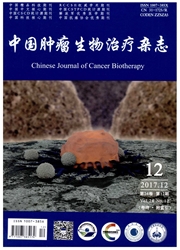

 中文摘要:
中文摘要:
目的:检测从肿瘤特异单链抗体库中筛选到的肿瘤血管特异结合单链抗体ScFvH1的靶向性和抑瘤性,探讨该抗体在癌症诊断和治疗中应用的可能性。方法:将该单链抗体基因插入到含绿色荧光蛋白(EGFP)基因及带有硫氧还原蛋白(Trx)基因的原核表达载体pET-28a(+)/EGFP及pTIG—Trx中,在大肠杆菌中进行表达,并经镍柱(Ni—NTA)纯化。建立人宫颈癌HeLa细胞裸鼠皮下移植瘤模型,尾静脉注射纯化的单链抗体-EGFP融合蛋白,通过荧光显微镜观察肿瘤部位及其他器官中EGFP信号,考察该单链抗体的靶向性;同时在裸鼠致瘤部位注射纯化的单链抗体蛋白,观察该单链抗体对肿瘤生长的抑制性。结果:在大肠杆菌中表达了该单链抗体基因片段,并使单链抗体-EGFP融合蛋白得到了很好的表达,经镍柱纯化后得到了电泳级的单一条带。靶向性实验结果显示,单链抗体-EGFP融合蛋白在肿瘤部位得到了富集,而只注射EGFP蛋白的肿瘤组织中荧光很少,并且在裸鼠肺部组织中没有观察到EGFP荧光信号。抑瘤性实验发现,单链抗体处理组移植瘤生长速率与PBS组类似。结论:从肿瘤特异单链抗体库中筛选到的肿瘤血管特异抗体ScFvH1具有较好的肿瘤血管靶向性,而对肿瘤生长的抑制作用不明显,为进一步研究抗体在肿瘤诊断和治疗中的应用奠定了基础。
 英文摘要:
英文摘要:
Objective: To investigate the targeting and anti-tumor ability of the tumor vessel-specific antibody ScFvH1 selected from phage-ScFv library, and to discuss the application of the antibody in clinical diagnosis and therapy of cancer. Methods: The ScFvH1 gene was inserted into pET-28a( + )/EGFP vector containing green fluorescent protein (GFP) gene and pTIG-Trx vector containing thioredoxin gene; the products were then expressed in E. coli and purified by using Ni-NTA. Tumor-bearing mice model was established by subcutanuous injection of cervical cancer cell line HeLa. The mice were injected with purified ScFv-EGFP fusion protein through vena caudalis and the GFP signals were observed by fluorescent microscope to evaluate the targeting ability of the antibody. Meanwhile, the mice model also received intratumoral injection of purified ScFv-EGFP fusion protein to evaluate the anti-tumor effect of the antibody. Results: Soluble ScFvH1 gene and ScFvH1-EGFP protein were successfully expressed in E. coli; a single band was showed in SDS-PAGE after the purification by Ni-NTA. We found that ScFvH1-EGFP fusion protein was enriched to tumor tissues, but there was only weak fluorescent signal when EGFP protein was injected. No EGFP signal was observed in the lung of tumor-bearing mice. Tumor inhibition experiment showed that the tumor growth in the antibody treatment group was similar to that of the PBS control group. Conclusion: The tumor vessel-specific antibody ScFvH1 selected from phage-ScFv library can specif- ically target tumor vessels, but it has no obvious inhibitory effect on tumor growth. Our findings pave a way for antibody in cancer diagnosis and treatment.
 同期刊论文项目
同期刊论文项目
 同项目期刊论文
同项目期刊论文
 期刊信息
期刊信息
